Haaretz
In a reality where Druze forces are at odds with pro-Iranian militias, Hezbollah units, Russian soldiers and Syrian army, a violent face-off that might drag Israel into a war is only a matter of time
The filet mignon at Nash Kray ("our country" in Russian), located in a high-end district in Damascus, is particularly delicious, according to restaurant recommendations in Syria. The fish carpaccio garnished with caviar is also recommended. The filet mignon is $16; add a first course of selected imported cheeses (about $5) and a nice dessert, and a customer can expect to pay around $30, including tip. Very cheap by Israeli standards, especially for anyone who has only dreamed of eating falafel in Damascus.
The photos of the offerings on the Facebook page of the restaurant, which is considered the finest and most luxurious in Syria, are very tempting, but only a select few – guests from abroad, arms and drug dealers, Russian officers or senior government officials can afford to dine there.
The real story is the owner, Luna Al-Shibl, who opened the restaurant in June of last year, and also serves as the personal advisor to President Bashar Assad.
Shibl began her career as a reporter and broadcaster at Al Jazeera. A few years later, when the civil broke out, she sided firmly with the Assad regime and quit Al Jazeera to become the "female face" of it. She talks to journalists, appears at political meetings, shapes propaganda and makes a lot of money along the way.
Her personal worth, not counting her income from the restaurant, is estimated at several million dollars. This at a time when the monthly salary of the lucky Syrian who managed to find a job barely covers the price of one meal at Nash Kray.
Shibl is a member of the Druze ethnic and religious minority and comes from the city of Sweida, in southwestern Syria. This has great political significance: both the city and the province of the same name are of Druze majority and the locus of fierce resistance to the Assad regime.
In 2015, Shibl delivered a harsh message from Assad to the residents of the province, saying they had two options: Let their sons join Assad's army and fight the rebels, or risk starvation. The threat had little effect: The Druze made it clear to Assad that they're not a party to the war and don't intend to be, and they will not send their sons to fight against other Syrians.
Two years ago, Shibl was once again asked to intervene in regard to her coreligionists in Sweida. She advised Assad to apologize personally to the leaders of its Druze community, after Syrian soldiers disrespected one of the sect's spiritual leaders, Sheikh Hikmat al-Hajri.
The president acceded, apologizing for the first time since the war began, averting, at least temporarily, a major confrontation between Druze and the regime. But Sweida and Daraa, the city where the civil revolt began 12 years ago, didn't calm down completely. From time to time, anti-regime demonstrations that lead to violent clashes flare up, such as those that took place last month in a town in Sweida province, demanding the removal of Iranian forces and Hezbollah members positioned near the Druze districts.
In May 2018, Russia and Israel reached an agreement according to which Russia would be responsible for removing Iran's Revolutionary Guards and affiliated militias, as well as Hezbollah forces, at least 85 kilometers (53 miles) east of the border with Israel and deploying Syrian troops along the border to guard it. The agreement followed a massive Israeli strike on Syrian and Iranian targets, after missiles were fired toward Israel from the Syrian Golan Heights.
In August the Russian presidential envoy in Syria Alexander Lavrentyev announced that he'd obtained agreement from Iran to withdraw its forces 85 kilometers from Israel's borders and said that Russian forces would be deployed to police the area.
But Russia's promise has remained mainly on paper. Hezbollah's positions were moved eastward, but not to the distance Israel requested, and additional Hezbollah forces and pro-Iran militias established themselves in the Sweida-Daraa area.
Russian forces continued to carry out police patrols in these areas, but at the same time it became clear that Hezbollah and Iranian militias, staffed partly by fighters recruited from among the Afghan refugees in Iran, bolstered their forces and established dozens of military outposts north of the cities of Sweida and Daraa.
Recently it was also reported that Iran plans to establish a large military base where its forces will be concentrated, instead of being dispersed in individual outposts. According to social media posts from Sweida, forces armed with heavy weapons and short-range missiles have already arrived at this base, and that the pro-Iranian militia members wear civilian clothes to disguise their military affiliation.
The accuracy of these reports hasn't been established, but the Iranian presence in southern Syria is engaged in additional fascinating activities that worry not only Israel but also Jordan.
Local Syrian sources reported that the pro-Iranian forces, in partnership with forces in the Syrian army, set up laboratories in the area for making Captagon, an illegal amphetamine.
Drug production to finance the Assad regime is nothing new. In 2018 Greek customs authorities seized a ship en route to Libya from the port of Latakia carrying six tons of processed Indian cannabis and about three million high-dose Captagon pills, with a total estimated value of about $100 million.
The development of a manufacturing center in southern Syria indicates an intention to turn Jordan into a transit country, as evidenced by Jordan's seizure of about six million Captagon pills whose presumed final destination was Arab states in the Persian Gulf.
Jordan has open trade relations with Syria, and King Abdullah also maintains a direct relationship with Assad. Nonetheless, the king fears the Syrian president will not and cannot curb a drug trade whose annual value has been estimated variously at $5 billion to $8 billion and that not only fills Assad's personal coffers but also the food chain of his forces and Iranian and pro-Iranian commanders and fighters.
Abdullah voiced his concern to U.S. President Joe Biden when they met last May. "The king warned that if the attempts to smuggle drugs through Jordan aren't stopped, Jordan will be forced to take more drastic measures," on top of its "shoot to kill" policy against drug traffickers, a Jordanian source told Haaretz.
Another source said Biden promised to join the anti-smuggling efforts. One result of the promise is the Captagon Act, passed by the U.S. Congress in December. But it's hard to view this law as the solution: While it orders government agencies to draw up an action plan to combat drug smuggling from Syria, it gives six months to submit it. The law includes the allocation of funding for its provisions but doesn't say how it should be distributed and what measures will be taken.
Abdullah and his Gulf state counterparts cannot relax for now. Jordan also appealed to Russia, as Syria's main sponsor, and Moscow responded quickly. After months of drawing down its policing forces in southern Syria in order to redeploy them against Ukraine, Russia reassigned policing forces from other Syrian provinces, increased the frequency of patrols and erected additional guard positions along the border with Jordan.
It's important for Russia that good relations are maintained between Syria and Jordan, where about 800,000 Syrian refugees live and through which Syrian traders can import and export goods. In general, any Arab country that maintains trade ties with Syria strengthens the legitimacy of the Assad regime.
Russia is also trying now to recruit groups of Druze fighters from the Sweida region to fight the drug smuggling. To that end it asked Sheikh Yahya al-Hajjar, the commander of the so-called Honor Forces, the largest Druze militia in the area, to enlist its 1,500 soldiers in the cause. Hajjar refused, citing the ethos of Druze neutrality established by the influential spiritual leader, Sheikh Rakan al-Atrash, who died in 2019, specified that the sect must not join the regime forces or the rebel forces.
Sheikh Hajjar said this week in an interview with the Saudi newspaper Asharq Al Awsat that "We'll not join any state that has military or economic interests in Syria. That's our position, that was determined nine years ago already." He added that he asked Russia to persuade Assad to free Druze prisoners and to establish an official border crossing between the Druze provinces and Jordan, in order to aid their economies, but nothing was done.
This position doesn't, however, prevent Druze from fighting drug smuggling and from arresting smugglers and handing them over to the authorities. That's considered a pointless activity, since these smugglers operate, inter alia, in service of the regime or at the very least, of the pro-Iranian forces in Syria.
In a reality where Druze forces – which aren't monolithic and are divided among at least three leaders – are at odds with pro-Iranian militias, Hezbollah forces, Russian policing units and soldiers of the Syrian army, a violent confrontation that'll turn into a small "provincial" war is only a matter of time.
Israel isn't currently a component of the power equation in the area, but an accidental rocket launch toward its territory or a different provocation would be enough to drag it into this power struggle and even exchanging blows with one of the parties.
Latest News
-
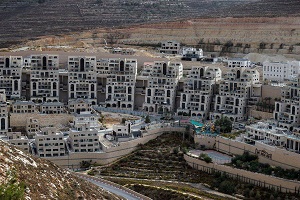 Jordan, Arab, Islamic countries condemn Israeli measures to impose sovereignty over West Bank
Jordan, Arab, Islamic countries condemn Israeli measures to impose sovereignty over West Bank
-
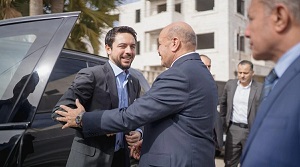 Crown Prince meets with community leaders, notables in Sahab District
Crown Prince meets with community leaders, notables in Sahab District
-
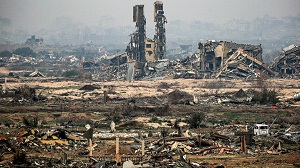 Top Hamas leader rejects disarmament or ‘foreign rule’
Top Hamas leader rejects disarmament or ‘foreign rule’
-
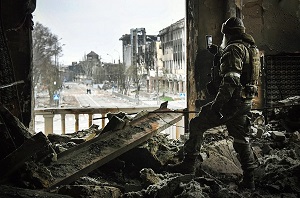 Zelensky: Trump wants Russia-Ukraine peace deal by June, before midterms focus
Zelensky: Trump wants Russia-Ukraine peace deal by June, before midterms focus
-
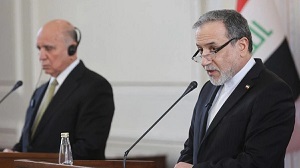 Iran doubts whether US taking negotiations seriously
Iran doubts whether US taking negotiations seriously